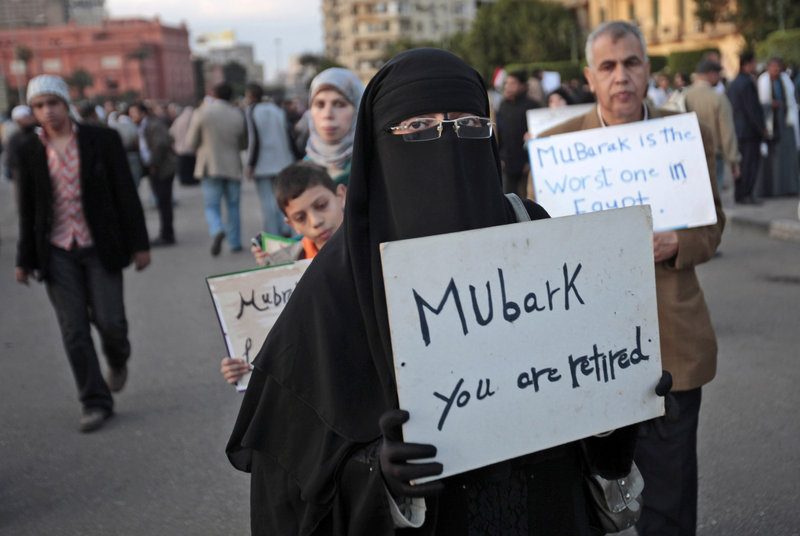CAIRO — Shaymaa Ahmed hasn’t eaten meat in two months. Bus fares have doubled, lentils are expensive and the money she makes as a secretary only covers the rent if her brother helps.
For the past three nights, Ahmed has slept in Tahrir Square. And she stays in this square, where tens of thousands of protesters gathered again on Monday, because she wants to make things better for herself and her family.
“I just want to live a good life,” she whispered, her voice gone from days of demanding an end to the autocratic rule of President Hosni Mubarak. “I want to have a clean home, cooking gas, meat.”
Ahmed, 23, has been the breadwinner since her parents died – her father nine years ago, her mother a year later — and the burden weighs on her. She hasn’t married because she wants to stay home and take care of her younger siblings, three brothers and a sister.
Her rent in the lower-middle-class district of Shubra is two-thirds of her monthly salary of about $60. A kilo of meat is almost a third of her salary. During the holidays in November she splurged and bought lamb.
“My salary doesn’t pay for anything. We have nothing. (Mubarak’s) making everything so expensive,” she said while sitting with her sister, Sara, and three friends she met during the protests. “Because we are silent, everything is getting worse.”
Ahmed joined the protests on Friday and saw police shoot at the crowds with tear-gas canisters, rubber bullets and live ammunition. She watched people die, some after being shot, others struck by government vehicles. There are two wounds on her leg where shrapnel pierced the skin.
She has found solace in Tahrir Square among others who want the same thing. And she has found power, too. Her voice finally means something.
“I feel now we’re stronger than the police and Mubarak,” she said.
She has lived her whole life here, where the rights of the opposition are severely limited, and, even with skills and an education, unemployment is high and salaries are low. Almost half of Egypt’s 80 million people live at or below the poverty line of $2 a day. Opportunities and wealth are reserved for the elite.
Dressed in skinny jeans and knee-high boots, Ahmed covered up in a ratty brown and beige blanket and chatted with new friends. They sat across from a tent bearing a sign that read “Freedom Motel.” Together, a few of the women leafed through the pages of an independent daily.
“Remember when the police threw bricks at us?” Shaymaa Abdul Munaar said to Ahmed as she pointed to photos in the paper. Together they were living a critical moment in their nation’s history.
Activists and demonstrators distributed tea, food and water to sustain them. At night they built fires to stay warm.
As others chatted around her, Ahmed grew quiet. “I just wish my parents were here,” she said, her eyes watering. She put her arm around her sister. “I think my mother would be proud.”
early afternoon, she and her sister and Abdul Munaar held hands and joined the walking demonstrators. When helicopters appeared, they screamed “Get out!” and pumped their fists.
“I am so happy because the people around me are united. We’re all speaking out,” Ahmed said as she disappeared into the crowd.
Send questions/comments to the editors.



Success. Please wait for the page to reload. If the page does not reload within 5 seconds, please refresh the page.
Enter your email and password to access comments.
Hi, to comment on stories you must . This profile is in addition to your subscription and website login.
Already have a commenting profile? .
Invalid username/password.
Please check your email to confirm and complete your registration.
Only subscribers are eligible to post comments. Please subscribe or login first for digital access. Here’s why.
Use the form below to reset your password. When you've submitted your account email, we will send an email with a reset code.